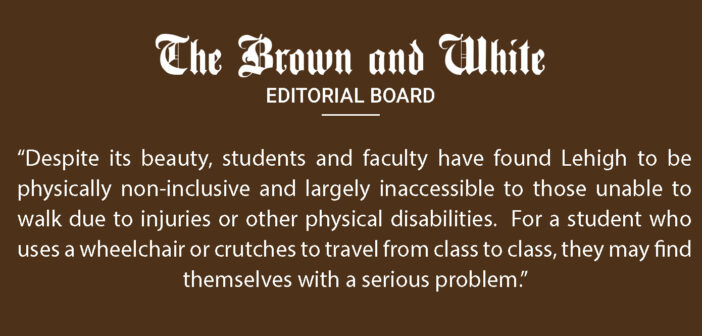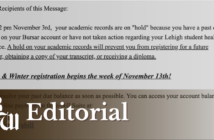Ranked as one of the most beautiful colleges in the U.S., one of the leading factors that attracts many students to Lehigh is the vision that is its campus.
With stone buildings and scenic walkways sprawled across South Mountain, it’s hard to deny the university’s beauty.
Yet, for those of us who find ourselves being a bit behind our Division 1 peers athletically, walking around Lehigh’s campus can feel like a workout at times.
When half of the campus can’t be reached without huffing and puffing up endless flights of stairs, every day is leg day here at Lehigh.
Jokes aside — despite its beauty, students and faculty have found Lehigh to be physically non-inclusive and largely inaccessible to those unable to walk due to injuries or physical disabilities. For a student who uses a wheelchair or crutches to travel from class to class, they may find themselves with a serious problem.
With March being National Disability Awareness Month, we recognize that one of higher education’s greatest challenges is disability inclusion on campus.
People from every gender, race, culture, sexual orientation, geographic region, age group and socioeconomic level are a part of the disabled community — it’s a group that does not discriminate.
In fact, in 2016, one in four adults in the U.S. reported having a disability.
When so many people across the country are disabled and our campus is limited by its physical geography, it is essential to have services such as Lehigh’s Take a Ride Around Campus Safely (TRACS) system, which, since its establishment in 1987, has been discontinued as a result of the Path to Prominence initiative. The TRACS service offered students a safe way around campus at night.
If students are unable to traverse campus by foot, they look to the often crowded bussing system or, at times, costly Ubers and Lyfts. Additionally, parking spaces for personal cars are inconvenient to find and expensive.
While some schools provide their students with access to free Ubers within a certain radius around campus, Lehigh is not one of them.
When students finally do make it to their desired destinations, much of the time, residence halls fail to provide students with services such as elevators — a fact that is slightly ironic considering our 2022 commencement speaker is the CEO of the world’s leading company for elevator and escalator manufacturing, Otis Worldwide Corporation and one of our most famous alumni is Jesse W. Reno, the inventor of the escalator.
Unlike Lehigh’s newer buildings that have been ongoing projects on campus in recent years, such as the Singleton, Hitch and Maida Houses and the College of Health building, it’s a challenging task to install elevators in older buildings that were constructed up to 150 years ago.
With this in mind and our practical inability to simply make Lehigh’s campus flatter, we can make the university more accessible to students and faculty dealing with disabilities and injuries by adding more ramps throughout campus, more disability support services, better seating accommodations in classrooms and reinstating services such as TRACS, to name a few ideas.
Finally, with more conversations and promises surrounding the support of students’ mental health on campus, we believe serious discussions about better accessibility on campus must now be prioritized as a top concern.
Back in 2015, Lehigh announced that more than 300 undergraduate and graduate students with a wide range of disabilities were attending Lehigh. However, where does that number lie now?
Have Lehigh’s efforts to become a more inclusive campus paid off or has its challenge of inaccessibility prevented more students with disabilities from applying to the school, furthering this matter of exclusion?
If Lehigh truly does wish to look after all of its students and employees, it cannot turn a blind eye to those who are in need of certain care.






Comment policy
Comments posted to The Brown and White website are reviewed by a moderator before being approved. Incendiary speech or harassing language, including comments targeted at individuals, may be deemed unacceptable and not published. Spam and other soliciting will also be declined.
The Brown and White also reserves the right to not publish entirely anonymous comments.
1 Comment
I generally agree… Yet we should want to keep and not liquidate, or really even dilute, our strengths as we go forward. A principle to keep in mind is that not everyone can get what he or she wants; not everyone is going to be fully pleased. This seems obvious, but it is something to keep in view and weigh… Additionally, Lehigh itself cannot *be* everything to everyone.
I think the essence of conservatism is to save what it special and valuable, while moving into the future and making the necessary changes, yes, all the while preserving what we identify and believe is beautiful, well made, individualistic, well thought out, etc.